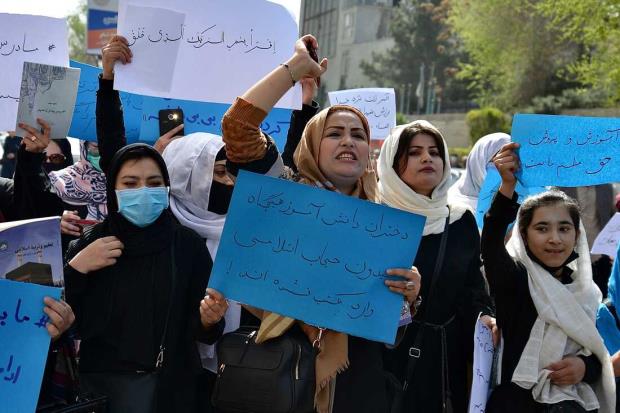Universities in Afghanistan have suspended any form of entry for women barring them from the much-needed access to education owing to their non-compliance with the norms and ethics laid down for them related to the dress code.
The move has invited sharp criticism from around the world, prompting coverage from global media and amid all the ruckus the Talibani Minister for Higher education has taken the central stage in responding to the move for the first time coming in from the administration directly.
The ban announced earlier this week is the latest restriction on women's rights in Afghanistan ordered by the Taliban since their return to power in August last year.
The move has been criticized by the Islamic nations as well who termed it against Islam. Although, in exact contrast, Neda Mohammad Nadeem, the minister for higher education in the Taliban government has said that the women studying in the universities have ignored the Islamic principle of adhering to the dress code in the educational institute, including what they should wear while being accompanied by a male relative when travelling.
"Unfortunately, after the passing of 14 months, the instructions of the Ministry of Higher Education of the Islamic Emirate regarding the education of women were not implemented," Nadeem said in an interview on state television.
"They were dressing like they were going to a wedding. Those girls who were coming to universities from home were also not following instructions on hijab."
He went on to say that some science subjects were not suitable for women to read, "Engineering, agriculture and some other courses do not match the dignity and honour of female students and also Afghan culture.”
Nadeem also informed that the authorities have also ordered the closure of madrassas that were only teaching females, whose proceedings were done in mosques.
The ban on university education came less than three months after thousands of women students were allowed to sit university entrance exams, many aspiring for teaching and medicine as future careers. Moreover, secondary schools for girls have been closed across most of the country for over a year.
Women have slowly been squeezed out of public life since the Taliban's return, pushed out of many government jobs or paid a fraction of their former salary to stay at home.
Among other bans imposed over the liberty of women in Afghanistan, including the ban on traveling without a male relative, being totally covered up in public, and prohibition from going to parks, fairs, gyms, and public baths as well.
The Taliban's treatment of women including its latest move to restrict university access for them drew a fierce reaction from the G7, whose ministers demanded the ban be reversed.
The minister further said in the statement that "Gender persecution may amount to a crime against humanity under the Rome Statute, to which Afghanistan is a state party.”
'Heartbreaking': Afghan school girls cry in pain after Taliban bans female education; Video Viral
The international community has made the right to education for all women a sticking point in negotiations over aid and recognition of the Taliban regime.
Saudi Arabia too expressed "astonishment and regret" at the ban, urging the Taliban to reverse it, while Nadeem hit back at the international community, saying it should "not interfere in Afghanistan's internal affairs".
Women have also started raising their voices in unison demanding their rights by staging protests on the streets of Kabul against the ban. Footage from one such protest has gone viral which was played by an international news agency where the protestors can be heard chanting, "They expelled women from universities. Oh, the respected people, support, support. Rights for everyone or no one!"
Talking to the same agency, a protestor said, "some of the girls" had been arrested by women police officers. Two were later released and two remained in custody.
The protests being staged by women in Afghanistan have extremely become rare in Afghanistan since the Taliban took over the country back in 2021, precisely after the detention of the core activists at the beginning of this year.
Those who take part in the protest risk arrest, brutality from the Taliban operatives, and a sheer stigma from their families.
After their takeover, universities were forced to implement new rules including gender-segregated classrooms and entrances, while women were only permitted to be taught by professors of the same sex, or old men.
The Taliban go after an austere version of Islam, with the movement’s Taliban’s supreme leader Hibatullah Akhundzada and his inner circle of clerics against the implementation of modern education, especially for girls and women.
Between the 20 years of the two Talibani reigns, girls were allowed to practice all forms of rights at par with their male counterparts, allowed to go to schools, and seek employment in all sectors, although the country largely remained conservative.
The authorities have also resorted to public floggings of men and women in recent weeks as they impose an extreme interpretation of Sharia on the Afghans.
